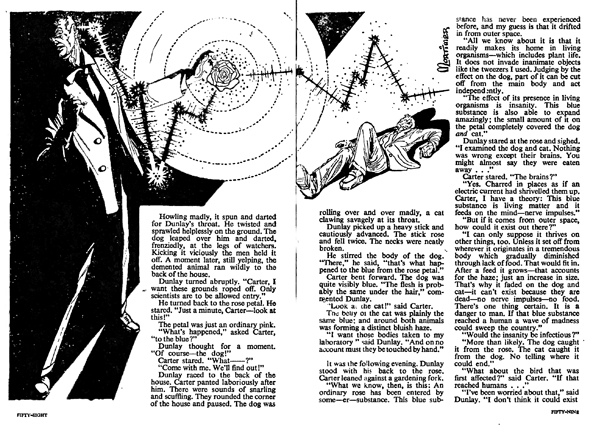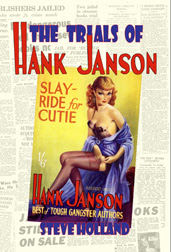Following on from last week's discovery of a previously unknown science fiction writer, I continued to dig further and have found another—but this time we can actually identify a couple of his stories. Both appeared under the name Ron Paul in the pages of Authentic Science Fiction Monthly: 'Blue Rose' (little more than a vignette) in issue 56 (April 1955) and 'Lonely Immortal' in issue 67 (March 1956).
In the 25 February 1956 issue of the Louth Standard, above a headline 'Science Fiction Writing. Young Louth author's profitable spare-time occupation', is a photo of Ron Tilling at his typewriter. Sadly, the image in the copy I have available is so poor that he is barely distinguishable from the typewriter. The article reveals much about Tilling's persistence.
Science fiction writing has been turned into a profitable spare-time occupation by 20-year-old Ron Tilling, of 10a Queen Street, Louth. After finishing his day's work in a Louth office, he begins work on his own typewriter—bought out of his spare-time earnings. But instead of accounts and business letters he taps out accounts of life on other planets, space ships, space travel and the like.
Since he started writing short stories three years ago Ron has had plenty of rejection slips, but has recently sold four stories—two to a science fiction magazine and two to "Midweek Reveille."
His writing has earned him 36gns., which has almost covered the cost of a new portable typewriter and a correspondence course on fiction writing.
Of science fiction writing he says "I try to base it on the accepted scientific possibilities. I hate fantasy."
To give his stories the right authentic backgrounds, he reads all he can in the way of scientific news, and uses his imagination to enlarge on it.
He took up writing as a hobby when he was at school. Prevented by attacks of asthma and bronchitis from joining in any kind of sport, he found he had more time on his hands than most boys.
Later, he helped form a concert party among Youth Centre members. It was named the Flying Saucers (even then things from outer space had a fascination for him), and he wrote the scripts for the one act plays which were produced by them.
The Saucers broke up in July, 1953 and Ron turned his hand to writing short stories. He took a correspondence course, and joined the Penman Club, who criticised his manuscripts and advised him about markets.
A typewriter was bought out of money he had saved, and by now the machine has almost paid for itself out of earnings.
His first effort, 'The Guests of Binham Hall' met with lots of rejection slips, as did the stories which came after.
Then his father died, and for almost six months Ron did not write a thing.
Last winter came his first success, a science fiction thriller, 'The Blue Rose,' was accepted by Authentic Science, a monthly magazine.
It was printed on 15th April—a great day for Ron—and appeared under his pen name Ron Paul. Paul, by the way, is the first part of girl friend Pauline's name.SHIFTED PLANETS
Since then another of his stories, 'Lonely Immortal,' has been accepted by the magazine, and two humorous stories have been accepted by Reveille.
"I used to enjoy reading science fiction, and that is how I came to write it," he explained. "There is a better chance of getting it published, too, because there are fewer science fiction writers."
Although the stories he has sold have taken only a few hours to write, he is not always able to dash them off so quickly.
One story, 'The Machine,' ran to 1,500 words when it was first written. After it had "done the rounds" of editors, he re-wrote it, this time extending it to 8,000 words and shifting it to another planet!
He has also tried his hand at dramatic fiction and religious drama, and altogether has completed some 50 short stories.
Ron is fast discovering the problems facing an up-and-coming writer. For instance, one editor to whom he submitted a story replied that there must be no mention of drink or gambling in the script. One of the scenes had been set in the bar of the "local."
Ron's mother, Mrs. A. G. Tilling, had an urge to write when she was young. She was Ron's first critic, and is very proud of his success.
He is a great reader. His favourite authors are Ray Bradbury, John Steinbeck, Somerset Maugham and Stephen Lister.
From the evidence in the article, it would appear that Ronald Tilling was born in 1936, his birth registered in Grimsby, not far from Louth in Lincolnshire. He was the younger son of James A. Tilling, a motor mechanic, and Alice Gertrude Johnson, who were married in 1928. A brother, Tony, was born in 1930. James Tilling died in early 1954, aged 51, and Alice married her second husband, David White, in 1957. The marriage did not last, as David died in 1958, aged 66, and Alice married a third time, to Cyril Leonard, in 1959. She died in 2002.
Ronald Tilling married Pauline Smith in early 1958, after which I lose track of him. [He is not the person named Ronald Tilling who died in 1982 (b.1918), 1988 (b.1914) or 2003 (b.1929).]
The Flying Saucers' Revue variety group ran for 14 months at the Louth Youth Centre and first performed in December 1950. The company of eleven was led by Mervyn Edward Cawte (1928-1996) and Miss K. M. Stephenson (warden), and made their first appearance at the Youth Centre's Christmas party with a half-hour show. The group included comedians, tap dancers, singers, and musicians.
They made their performance debut in March 1951 at the Liberal Club in aid of the Old Age Pensioners' Building Fund. Ron Tilling appeared in a one act comedy play, 'To-day Of All Days', produced by Miss K. M. Stevenson and Mrs. E. Teesdale. A later show in June included a theme song ('Two Little Men in a Flying Saucer'), which opened the show, with Tilling appearing in appearing in comedy sketches.
They disbanded in January 1952 with some of the Saucers deciding to form a new company, the District Amateur Variety Entertainments Company, led by M. E. Cawte, with Ron Tilling as Secretary. I have a feeling that this was a short-lived venture as Cawte was soon after separated from his wife and moved to Southsea.


























































He's quite possibly still alive, isn't he Steve? After all, his record, and those of his two(?) siblings, is still closed in the 1939 Register.
ReplyDeleteQuite possibly. One of the reasons I write up these authors is that they or a family member might spot it and write in.
ReplyDelete